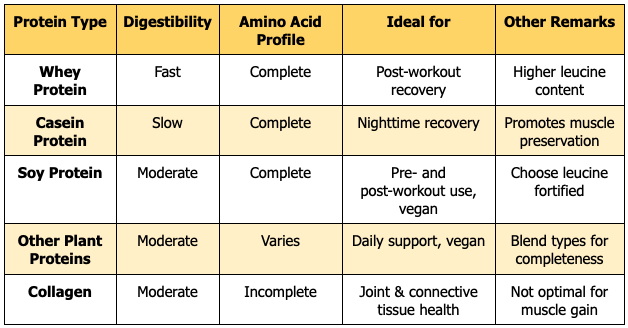March 25, 2025 by Admin
Whey-ing The Best Type of Protein for Your Body
Protein often takes center stage when it comes to exercise and athletic performance. Whether you aim to build muscle, recover faster, or maintain overall health, getting the right type and amount of protein is key. However, with various protein supplements available, finding the best one for yourself can be challenging.
Whether you are a seasoned athlete or just starting your fitness journey, this article will help you “whey” the options and find the best protein to support your goals.
What Are The Types of Protein Supplements?
The protein supplement market offers various types, each with unique benefits depending on your goals:
- Whey Protein: Derived from milk, whey protein is a “complete protein” because it contains all essential amino acids. It can be further divided into three main forms:
- Whey Concentrate: The most affordable form of whey protein, contains 70-80% protein by weight along with small amounts of carbohydrate and fat.
- Whey Isolate: Higher purity, minimal carbohydrate and fats.
- Whey Hydrolysate: Pre-digested for faster absorption, suitable for the sensitive gut
- Casein Protein: Also milk-derived, casein is slower to digest than whey protein, making it perfect for sustained amino acid release.
- Soy Protein: One of the few complete proteins from non-animal sources and has a moderate absorption rate (between whey and casein). It has lower leucine content compared to whey protein, but this can be solved by choosing those fortified with leucine.
- Other Plant-Based Proteins: Sources like pea, hemp, and rice protein are excellent for those with dietary restrictions or preferences. Though plant proteins sometimes lack one or more essential amino acids, blending different sources can provide a full amino acid profile.
- Collagen Protein: Although incomplete in essential amino acids, collagen supports joint, skin, and connective tissue health.
Let’s Compare The Types Of Protein Supplements
Each protein type offers specific benefits depending on an athlete’s goals, dietary needs, and timing of consumption.

The Importance of Amino Acid Profile and Leucine
When selecting a protein supplement, the amino acid profile is a key factor, as it determines how effectively the protein supplement can support muscle repair, growth, and overall recovery. Complete proteins, which contain all nine essential amino acids, provide a more balanced and effective profile for supporting muscle maintenance and recovery.
Among these, leucine stands out as a crucial amino acid for muscle protein synthesis (MPS), the process by which the body repairs and builds muscle tissue after exercise. Leucine is a primary trigger for activating MPS and helps enhance muscle recovery and growth, making it vital for athletes and active individuals. High-leucine proteins, such as whey, are particularly effective in post-workout recovery, delivering a rapid, concentrated dose to stimulate muscle repair.
If your goal is to support muscle growth and recovery, it’s important to choose a supplement with a complete amino acid profile, especially one rich in EAAs and leucine. This will help maximize your body’s ability to rebuild muscle tissue and enhance workout results.
Additional Tips for Choosing the Right Protein Supplement
- Identify Your Goal
- Muscle Building: Whey protein is effective for rapid post-workout muscle repair because of its fast absorption and high leucine content.
- Sustained Recovery: If your goal is to maintain steady protein availability (e.g., overnight), casein’s slow release is ideal.
- General Health or Weight Management: Soy protein offers a balanced amino acid profile, is plant-based, and may support additional health benefits.
- Consider Dietary Preferences and Restrictions
- Lactose Intolerance or Vegan Lifestyle: Soy or a combination of pea and rice proteins is often best for those who prefer to avoid dairy or follow a plant-based diet.
- Allergies and Sensitivities: Pea and rice proteins are typically hypoallergenic, making them suitable for gut sensitive individuals.
- Check protein content per serving
Protein needs vary between individuals, but most active individuals will benefit from 20 – 40 grams of protein per serving. - Budget
Whey concentrate offers good value, while isolates are better for gut sensitive athletes or those seeking low-carb or low-fat options. Plant-based proteins vary in cost but may cost slightly higher than animal-based proteins.
Conclusion
The best protein supplement is one that aligns with your specific needs, dietary restrictions, and fitness goals. By understanding the amino acid profile and the unique qualities of each protein type, you can maximize your fitness goals. You can choose whey protein for quick recovery; casein for overnight repair; or soy for a balanced plant-based option. Making the right choice of protein source that aligns with your fitness goals can make a noticeable difference in your exercise outcomes.
Reference
Australian Institute of Sport. (2023). The Australian Institute of Sport (AIS) Supplement Framework, Isolated Protein Supplements.
Tang JE, Moore DR, Kujbida GW, Tarnopolsky MA, Phillips SM. Ingestion of whey hydrolysate, casein, or soy protein isolate: Effects on mixed muscle protein synthesis at rest and after resistance exercise in young men. J Appl Physiol. 2009;107(3):987-992.
Kårlund, A., Gómez-Gallego, C., Turpeinen, A. M., Palo-Oja, O. M., El-Nezami, H., & Kolehmainen, M. (2019). Protein supplements and their relation with nutrition, microbiota composition and health: is more protein always better for sportspeople?. Nutrients, 11(4), 829.
Jäger, R., Kerksick, C. M., Campbell, B. I., Cribb, P. J., Wells, S. D., Skwiat, T. M., Purpura, Martin., Ziegenfuss, T. N., Ferrando, A. A., Arent, S. M., Smith-Ryan, A. E., Stout, J. R., Arciero, P. J., Ormsbee, M. J., Taylor, L. W., Wilborn, C. D., Kalman, D. S., Kreider, R. B., Willoughby, D. S., Hoffman, J. R., Krzykowski, J. L., & Antonio, J. (2017). International society of sports nutrition position stand: protein and exercise. Journal of the International Society of Sports Nutrition, 14(20), 1-25.
Huecker, M., Sarav, M., Pearlman, M., & Laster, J. (2019). Protein supplementation in sport: source, timing, and intended benefits. Current nutrition reports, 8(4), 382-396.
